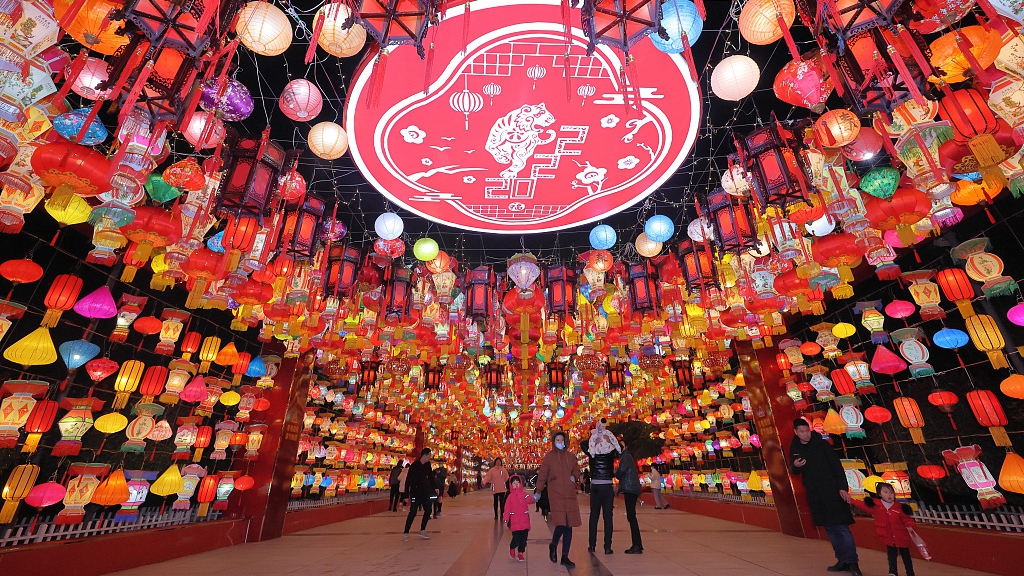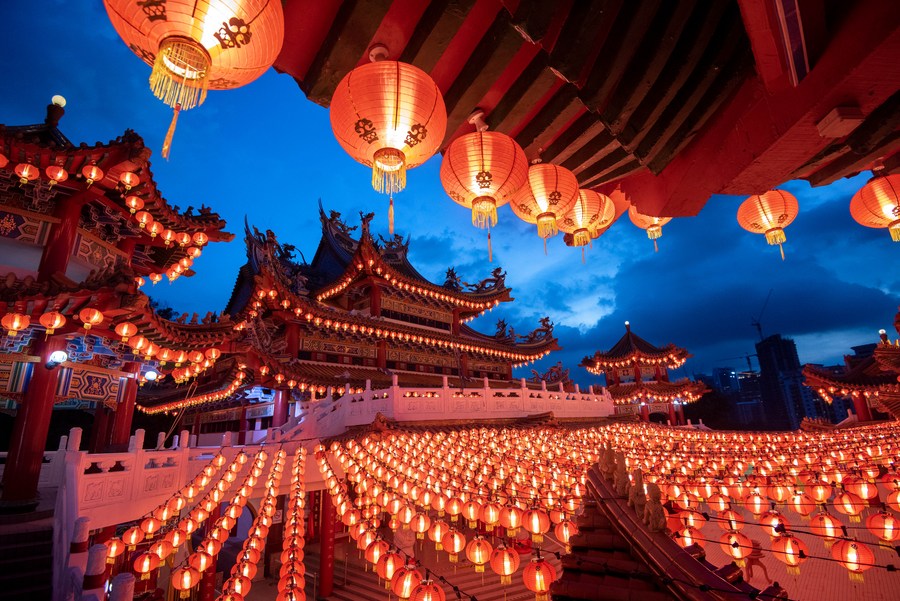
People are enjoying Spring Festival lanterns show in Yuncheng, China's Shanxi Province, January 29, 2022. /CFP
People are enjoying Spring Festival lanterns show in Yuncheng, China's Shanxi Province, January 29, 2022. /CFP
Editor's note: Keith Lamb is a University of Oxford graduate with a Master of Science in Contemporary Chinese Studies. His primary research interests are China's international relations and "socialism with Chinese characteristics." The article reflects the author's opinions and not necessarily the views of CGTN.
Chinese New Year, commonly known as the Spring Festival, with its roots in China's ancient Shang dynasty, goes back approximately 3,500 years. Steeped in legend, it is said that the use of firecrackers used to "ring in" the Spring Festival started when villagers used them to scare away, a beast terrorizing them, named Nian.
However, while the Spring Festival has its roots in Chinese culture, its growing significance is also a marker of the rise of East Asia, which in turn represents the rise of the multipolar world order. Furthermore, the values inherent in this festival, increasingly adopted across the world, are representative of our shared common humanity.
The Spring Festival, which marks the first day of the lunisolar calendar, has long been an East Asian festival celebrated as Seollal in Korea, Tết in Vietnam, and Tsagaan Sar in Mongolia. In addition, Chinese New Year is widely celebrated across South East Asia, which is home to a large ethnic Chinese diaspora. In large Western cities such as Vancouver, New York, London, and Sydney, every year, there are an increasing number of celebratory events, like the traditional Lion and Dragon dances.
The spread of the Spring Festival, which marks the rise of both China and East Asia, has come about due to the growing economic importance of this region. Its insertion into the consciousness of Westerners, like Diwali arising from the Hindu civilization and Ramadan arising from the Arabic civilization, is a marker of greater democratization of the process of globalization.
Indeed, the mere celebration of the Spring Festival, based on its own calendar, is a reminder that even the most basic foundations of our modern world system, such as the counting of time through the Western Gregorian Calendar, is not universal but something that has arisen from the history of one civilization.
Unlike other festivals, Chinese New Year doesn't have a religious base. True, there are traditions such as appeasing the "Kitchen God" by setting out treats, but this isn't inherent to the New Year itself, which merely marks the first day of spring and the new year.
Indeed, Chinese New Year is celebrated differently by those of different faiths. Buddhists may go to the temple; Taoists may ritually burn paper money, and Chinese Christians, in Malaysia, add benedictions to it. Thus, the Spring Festival, like Chinese civilization itself, represents a tolerant festival that unites the diverse.

Red lanterns set for Chinese Lunar New Year are pictured at Thean Hou Temple in Kuala Lumpur, Malaysia, February 2, 2021. /Xinhua
Red lanterns set for Chinese Lunar New Year are pictured at Thean Hou Temple in Kuala Lumpur, Malaysia, February 2, 2021. /Xinhua
However, clearly, while a single religion isn't at the core of the Spring Festival, there are values inherent in its celebration that are widely understood worldwide. For example, filial piety and respect for one's elders and, by extension, in the case of China, one's ancestors are a very important part of the festival. Consequently, the Spring Festival is a celebration of life and our relationships with others, especially within the families who nurture us.
This celebration of life and the family is clearly demonstrated by the billions of journeys that take place in China as families seek to come together. It is demonstrated by the shared feasting and the gifts of money given to the young and the old, which strengthens family bonds.
Of course, this celebration of life, in the form of the gathering of families and gift-giving, is also present at Christmas. Thus, both serve to demonstrate that humans, arising out of different civilizations and histories, have much in common, and it is merely the expression of the cultural form which is different.
I would even go as far as to say that both Christmas and the Spring Festival are manifestations of how humanity deals with survival when faced with shared environmental circumstances. Both festivals, arising in the northern hemisphere, fall at a time when the weather is cold, when nights are long, and when food would have been scarce. As such, both festivals provide a timely morale boost, needed to overcome adverse conditions, and both festivals serve to reinforce the essential social bonds needed for our shared human survival.
As we reflect on the coming Spring Festival, we need to bear in mind that in our modern age, with the threat of ecological collapse and nuclear war, our survival as a species also depends, more than ever, on renewing our bonds of fraternity beyond the narrow interests of a single civilization, race or religion which divide us.
Chinese New Year does provide glimmers of hope in the backdrop of the winter of a new cold war. Firstly, for the common people, especially in Western countries, it provides one of the few glimpses into China without the incessant negative propaganda, which turns the mundane into the monstrosity.
Secondly, for global leaders, it provides an opportunity to break out of the cold war cycle, and offer a congratulatory message to China and the global Chinese diaspora. Some even learned the phrase "Xin nian kuai le" which means "Happy New Year."
As China and Asia continue their economic rise, the Spring Festival, like Christmas, will become an increasingly important fixture on the global stage. With this in mind, we must learn that the rise of others doesn't mean the fall of one. In fact, if Christmas and the Spring Festival have a metaphor in common, it is that only through sharing and cooperation that we can all prosper.
(If you want to contribute and have specific expertise, please contact us at opinions@cgtn.com.)

